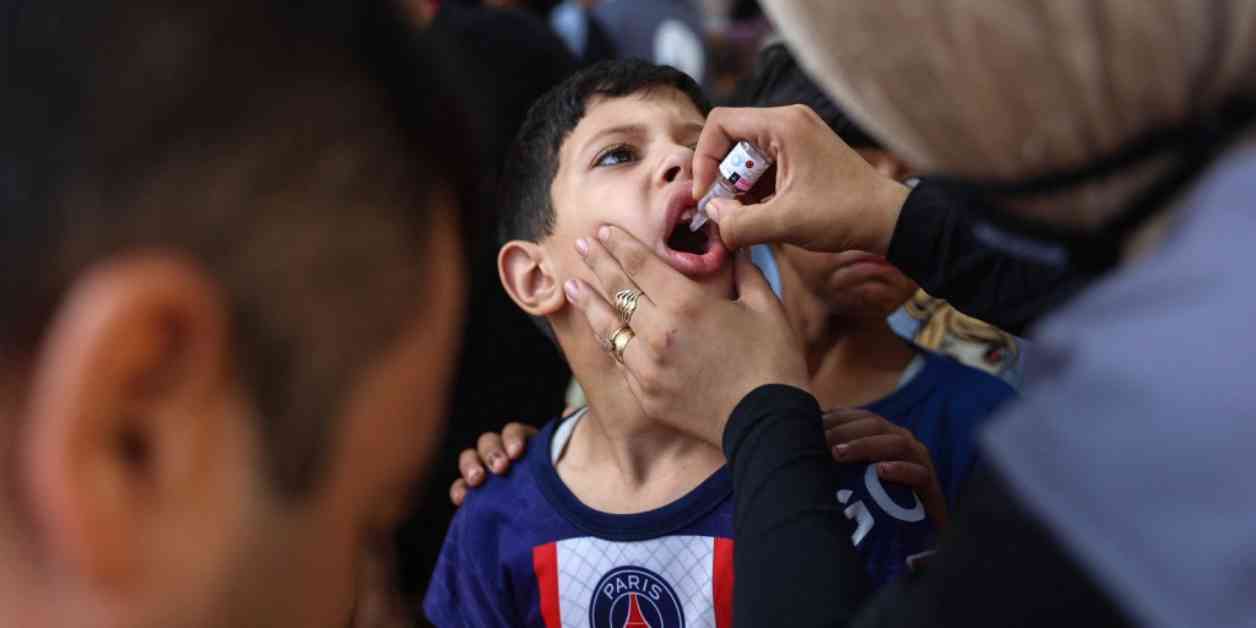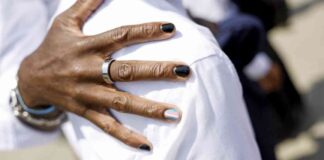Protecting Gaza’s Children: Over 550,000 Vaccinated Against Polio
In a remarkable effort to protect the children of Gaza, over 550,000 kids have received their first dose of the polio vaccine, the World Health Organization (WHO) announced on Thursday. Dr. Rik Peeperkorn, the WHO’s representative for the West Bank and Gaza, commended the massive vaccination campaign, stating, “We reached an enormous amount of children in this short time.” The initiative took advantage of brief moments of humanitarian pause in the ongoing conflict between Israel and Hamas in Gaza to administer oral drops of the polio vaccine to the vulnerable population.
Efforts to vaccinate the children of Gaza were met with great success, with 552,451 kids receiving the life-saving vaccine during the campaign. Dr. Peeperkorn expressed confidence that they were able to reach their target of vaccinating at least 90% of children under the age of 10. Despite the challenges of accurately tracking displaced children in Gaza, Peeperkorn and his team were able to ensure that a vast majority of the target population received the vital vaccine.
The response from families in Gaza was overwhelmingly positive, with parents actively seeking out vaccination sites to ensure their children were protected against polio. Dr. Peeperkorn praised the families for their dedication, stating, “Everywhere the team has gone, parents are doing all they can to ensure their child does not miss vaccination.” The vaccination sites offered a glimmer of hope for Gazan families who have endured months of war trauma, food scarcity, and inadequate access to clean water and sanitation.
Nongovernmental organizations (NGOs) involved in the vaccination efforts echoed the WHO’s sentiments, emphasizing the importance of community participation in the campaign. Chessa Latifi, deputy director of emergency response for the NGO Project HOPE, noted that the turnout at vaccine clinics exceeded their expectations. Project HOPE successfully vaccinated over 2,000 children against polio, while another NGO, MedGlobal, administered approximately 5,000 doses of the polio vaccine in Gaza.
Dr. Zaher Sahloul, president of MedGlobal, highlighted the resilience of Gazan families who prioritized the health of their children amidst the ongoing conflict. He remarked, “When you come out despite the war and the threat on your lives and vaccinate, it means that families really care about the health of their children and their communities.” The collective effort to protect vulnerable children in Gaza demonstrated the unwavering commitment to public health in the face of adversity.
The urgency to vaccinate against polio in Gaza was prompted by the detection of the poliovirus in wastewater samples from two sites in the region over the summer. The strain of the virus found is linked to a polio vaccine no longer used in the U.S. but still administered in other parts of the world. The oral vaccine contains a weakened form of the poliovirus and is crucial in preventing the spread of the highly contagious disease in areas with compromised sanitation systems.
The first recorded case of polio in Gaza in at least 25 years was reported in a 10-month-old baby in the city of Deir al-Balah, sparking concerns about the potential spread of the virus. Polio can cause severe muscle weakness and paralysis, posing a significant threat to children in the region. Test results on three other children in Gaza showing symptoms of “acute flaccid paralysis,” a condition associated with polio, are pending, raising fears of additional cases in the community.
While severe cases of polio may be limited, the likelihood of mild or asymptomatic cases is high, with each reported case potentially representing hundreds of undetected infections. The Centers for Disease Control and Prevention estimate that for every case of polio, there may be anywhere from 200 to 1,900 mild or asymptomatic cases, underscoring the importance of comprehensive vaccination efforts to prevent further transmission of the disease.
The success of the initial vaccination campaign in Gaza underscores the need for continued efforts to ensure that all children receive the necessary protection against polio. A second dose of the vaccine will be required in four weeks to provide long-lasting immunity and safeguard the health of the vulnerable population. Chessa Latifi emphasized the importance of sustained vaccination efforts, stating, “There’s always a chance that these people are not going to be able to return, which then renders the vaccine much less effective. We’re really hoping that the continued displacement is somewhat limited over the next month.”
The collaborative efforts of international organizations, NGOs, and local communities in Gaza have demonstrated the resilience and determination to protect the health and well-being of children in the region. The successful vaccination campaign serves as a beacon of hope amidst the challenges faced by Gazan families, offering a tangible solution to combat the threat of polio and safeguard the future generations of Gaza.


















